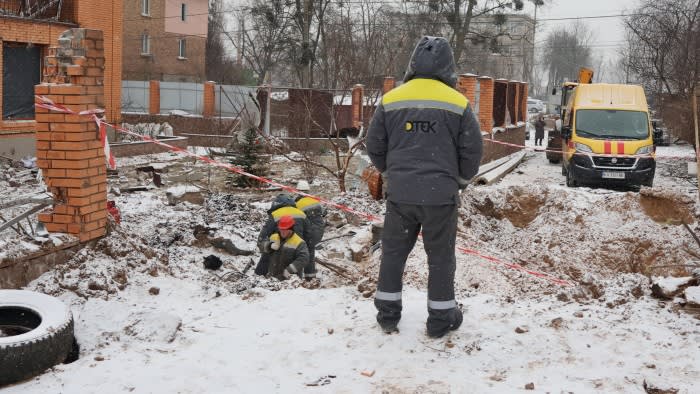Stay informed with free updates
Simply sign up to the War in Ukraine myFT Digest — delivered directly to your inbox.
Ukraine could lose the energy war against Russia if stalled US aid does not arrive soon, the chief of the country’s largest private power producer warned.
The call from DTEK chief executive Maxim Timchenko adds to Kyiv’s growing concerns about an aid package blocked by Republicans in Congress, which Ukrainian officials said needs to arrive “within a month” to help the country’s armed forces hold off the Russian invasion, now in its third year.
“After two years of this fighting, we cannot afford to lose this energy war,” Timchenko told the Financial Times. “And there is a risk that we can start losing just because what was promised was not delivered,” he added.
As in 2022, Russia stepped up its aerial attacks on Ukraine’s energy system ahead of this winter, seeking to leave people in the dark and cold.
Ukraine’s victory “depends not only on the people on the frontline, but also how our economy survives. How our industries and regular businesses keep operating,” Timchenko said. Electricity supply is “equally important during summer and the winter”.

The World Bank in November estimated that the damage to Ukraine’s energy sector during the war stood at $12bn, with more than 50 per cent of the country’s power infrastructure damaged in the winter of 2022/2023.
Ukraine was initially more prepared and able to protect its energy infrastructure in the early months of winter, but in recent weeks “more drones and more missiles reach their target”, Timchenko said, as the country struggles to deploy sufficient air defences amid depleting western ammunition.
The shortage of ammunition has been aggravated by the Congressional dispute, which has held up the $60bn in US aid, half of which would be for weaponry. European ammunition and missiles meanwhile are also in short supply, even as EU capitals currently seek to cobble together emergency aid.
“We restore our power equipment every week from the shelling. And the feeling that we become more unprotected, it just harms our confidence a lot,” said Dtek’s chief.
The company, which supplies about 20 per cent of Ukraine’s power needs, has recorded over 9,700 attacks on its infrastructure since the full-scale invasion started in February 2022. Almost 160 strikes were on the company’s thermal power plants, DTEK said.
This year alone, the company has endured 150 attacks while over 1mn households and businesses have suffered blackouts in DTEK areas, it said.
As winter is coming to an end, energy demand will drop, but Timchenko warned against “relaxing” over the next six months just “because we are not frozen in summer”.
He said that one of the ways Ukraine could improve its resilience against Russian attacks was by expanding renewable energy. One critical explosion inside a power station could take huge amounts of electricity offline in an instant, but that is unlikely to happen with wind farms, where the same amount of electricity generation would be spread across multiple turbines, making it difficult to knock down in a single strike.
DTEK opened its 114MW Tyligulska wind power plant in May last year, and plans to increase the capacity to 500MW in the coming years. It also aims to build another 650MW project to the south of Kyiv. “We can build more renewables. We can strengthen our energy security. We export power out of Ukraine now, so [more renewables can] strengthen the energy security of the EU as well,” Timchenko said.
He admitted that it would be hard for foreign companies to spend millions of dollars developing renewable energy in Ukraine now, due to the security concerns, but that they should start to make preparations for when “we get more [air defences], and we feel that we are protected”.
